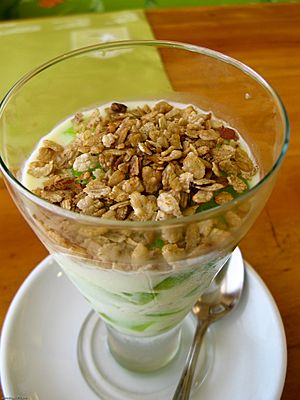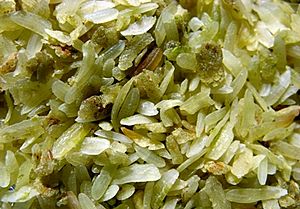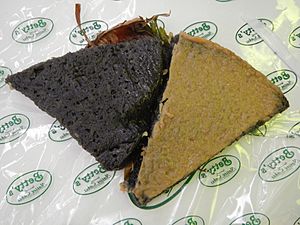Pinipig facts for kids

Pinipig toppings on buko pandan (a drink made from coconut meat, cream, and gulaman cubes flavored with pandan leaves)
|
|
| Place of origin | Philippines |
|---|---|
| Main ingredients | glutinous rice |
Pinipig is a special kind of flattened rice from the Philippines. It's made from young, green grains of glutinous rice, also known as "sticky rice." These grains are pounded flat and then toasted until they are crispy. Pinipig is often used as a topping for yummy Filipino desserts. You can also eat it by itself, make it into cakes, or mix it into drinks and other foods.
Contents
How Pinipig is Made
Pinipig is made only from glutinous rice, which Filipinos call malagkit. The process starts when the rice grains are still young and green.
Harvesting and Preparing the Grains
First, farmers harvest the rice while the grains are still green. Then, the outer husks are removed from the grains. After that, the light, unwanted parts called chaff are separated from the good rice grains. This is often done using large, flat baskets called bilao, which help to "winnow" or blow away the chaff.
Pounding and Toasting
The bright green rice kernels are then placed in big wooden mortars. They are pounded with large wooden tools called pestles until they become flat. Finally, these flattened grains are toasted dry in pans or baked until they are crispy and ready to eat.
What Pinipig Looks Like
When pinipig is freshly made, it has a light green color. But after it's toasted, it usually turns yellowish-white or light brown. It might look a bit like oats, but it's different from puffed rice. When you eat pinipig, it's crunchy on the outside and a bit chewy in the middle.
Different Kinds of Pinipig
There's a special type of pinipig called duman that comes from Santa Rita, Pampanga in the Philippines. Like regular pinipig, duman is also made from young, green glutinous rice grains. The main difference is that duman is toasted before it is pounded flat.
A similar sweet treat is also found in other countries. For example, there's a delicacy called cốm in Vietnam and Thailand that is made in a similar way.
 | Stephanie Wilson |
 | Charles Bolden |
 | Ronald McNair |
 | Frederick D. Gregory |



